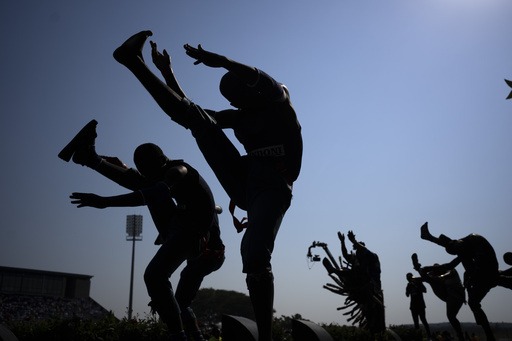CAPE TOWN, South Africa (AP) — South Africans will vote Wednesday to decide whether their country will take its most significant political step since the moment 30 years ago when it brought down apartheid and achieved democracy.
This national election will not be as momentous as the one South Africa held in 1994 — few have been. Then, Nelson Mandela led the African National Congress party to victory as Black South Africans who were the majority were allowed to vote for the first time. It officially ended a half-century of racial segregation under apartheid — a violently enforced system that attracted the world’s outrage — and hundreds of years of white minority rule.
But while the ANC still governs in 2024, it is amid rising discontent caused largely by high levels of unemployment and poverty. That could result in a majority of South Africans choosing another party this week over the one that led them to freedom.
“Thirty years of South African democracy does not mean we should endure an eternity under the ANC,” John Steenhuisen, the leader of the main opposition Democratic Alliance party, said in the run-up to the election.
Any change is not expected to be sweeping, though.
The possible repercussions are complex because while several polls have the ANC’s support at less than 50%, suggesting it is in danger of losing its majority for the first time, no opposition party has risen to a position to overtake it. The ANC is still widely expected to be the largest party, well ahead of an increasing number of opposition movements that are splitting the disaffected vote.
But without an outright majority, the ANC would likely have to strike agreements or coalitions with others to remain in government and reelect President Cyril Ramaphosa. That would end its political dominance of post-apartheid South Africa and herald a new era, where the ANC co-governs.
The ANC won six successive national elections, starting with the one that made Mandela the first Black president in 1994. But from a high of gaining nearly 70% of the vote 20 years ago, it has experienced a steady decline in support while South Africa grapples with deep socio-economic problems, some of which were left over from apartheid.
The ANC has also been criticized for the corruption scandals that have plagued it and for not tackling the country’s violent crime problem. There were an average of 83 homicides a day in the last three months of 2023. A failure in basic government services impacts many in the country of 62 million, with communities, towns and parts of major cities going without water and electricity.
The issue that stands out, though, is joblessness and the resulting poverty. South Africa’s official unemployment rate is ranked the world’s worst at 32%, and it’s even higher — at 45% — for young people aged between 15 and 34. That sits at odds with the country’s status as the most advanced on the African continent. The World Bank estimates more than half of South Africans live below the poverty line.
“Together we will do more and we will do better,” ANC leader Ramaphosa said in what’s almost become a party motto. At the ANC’s last major rally this weekend, he said it still represents the aspirations of South Africa’s people and promised to prioritize job programs and extend social support for the millions that rely on government grants.
The ANC asserts it is the only party that can effectively govern South Africa and while it’s undoubtedly facing its biggest electoral challenge, analysts point out that it has the most effective grass-roots campaigning machine and has traditional support among older South Africans and those in rural areas, voices that are generally given less airtime. The possibility of the ANC clinging onto its majority has not been ruled out.
The election will take place on one day, with nearly 28 million people registered to vote across the nation’s nine provinces. They will decide the makeup of the national Parliament but also the provincial legislatures. More than 50 parties are registered to contest the national election, a record number, and independent candidates have been allowed to stand for the first time.
South Africans don’t vote directly for their president, but rather for parties. Those parties get seats in Parliament according to their share of the national vote and lawmakers elect the president, who has always been from the ANC because of its parliamentary majority.
Just over 80% of South Africans are Black, but it’s a multiracial country, with significant numbers of people who are white, of Indian heritage or with biracial ethnicity. Mandela referred to South Africa as a “Rainbow Nation” as he attempted to harness that diversity into a new unity after apartheid.
But three decades later, poverty still disproportionately affects the Black majority. While they disagree strongly on policy and are in no way united, the main opposition parties, from the centrist DA to the far-left Economic Freedom Fighters and the new MK Party of former President Jacob Zuma, repeat one theme: that the ANC has failed to live up to its 1994 promise, when it swept to victory under the slogan “A Better Life For All.”
The ANC’s fading allure may be seen most clearly among young people, the South Africans in that 15-34 age bracket who didn’t experience apartheid or have no memory of it and many of whom are now voters. This election could give voice to a new generation, who are aware of apartheid and the ANC’s role in defeating it through stories told by their parents and grandparents but don’t see how it helps them three decades later.
“The youth were not born, so we can’t tell them about fighting for freedom,” said Simphiwe Mpungose, a provincial organizer with the new MK Party. “They are concerned about what they see now.”
___
Associated Press writers Mogomotsi Magome in Johannesburg and Farai Mutsaka in Durban, South Africa, contributed.
___
AP Africa news: https://apnews.com/hub/africa


